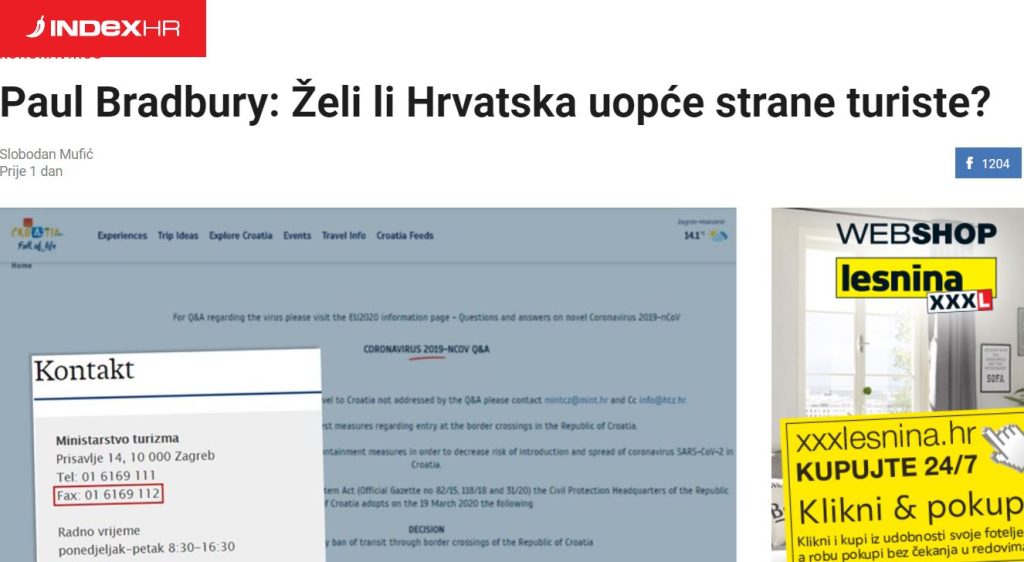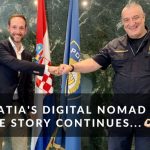May 11, 2020 – Digital nomad tourism is an obvious tourism strategy of the future. Thanks to Dutch entrepreneur Jan de Jong in Split, it made its first appearance in the Croatian media today.
Did you feel that?
It is not quite the strength of the famous Adriatic bura, but it is a wind of change.
What a week!
First of all, the Ministry of Tourism decided to upgrade from an email-free ministry, with the humble facsimile at the core of its communications strategy on its homepage…
… to a totally faxless ministry, replaced by not one but FOUR email options.
Prior to that, some even more progressive news in the digital era – the concept of digital nomad tourism as a strategy for the development was muted for the first time at a national Croatian tourism conference, SMART Tourism 5.0.
Dutch entrepreneur Jan de Jong, who has already created hundreds of Croatian jobs in internet marketing since moving to Split in 2006, was the man behind the initiative after reading some articles on TCN. You can see him put forward his arguments for Croatia as a digital nomad tourism destination in the conference video clip aboe.
De Jong’s arguments resonated with many, and today another milestone for the digital nomad tourism initiative, as de Jong featured in a full-page interview with Vecernji List. The first – but certainly not the last – time that digital nomad tourism has featured in the Croatian national media.
It is almost a year since TCN started writing about the potential of digital nomad tourism in Croatia in Branding Croatia: 5 Gifts and Trends to Focus On.
On June 19, 2019, I wrote an article called How Croatia is Becoming Increasingly Attractive for the Digital Nomad Lifestyle.
In it, I wrote about the daily routine of a Russian-Ukrainian couple in Munich, and their daily routine in Jelsa from April 1 – June 30:
Let me give you an example from a meeting I had yesterday with a very nice Ukrainian and Russian couple in their early 40s here on Hvar. They live in Munich and he works for an IT company, where the boss has decided that his staff would be happier and more productive if he let them work remotely 10 months a year, with only 1-2 months required in the office. The boss himself only spends 6 months in the office and has arranged things whereby he can spend the other half in the warmth of Asia.
The couple I met last night decided that they wanted to use the opportunity to travel and to experience life in different countries and integrate into communities. The wife came with her family to Jelsa 19 years ago on holiday, and the memories were warm enough for them to decide to put Jelsa into their plan, and so they have been here for 3 months, from April to June, with plans to do exactly the same next year. From Jelsa, they will move to Sicily for 2-3 months and then onto Portugal or Spain. And after the required stop in Munich, it will be back to Jelsa next April.
The working day is just like any other for someone working online. Deadlines, phone calls, emails, contact with bosses and colleagues. But all this is done remotely. What is different is that each morning starts with a swim before work and a swim after work. They shop in the market, drink coffee in the cafes, and eat in the restaurants. They are even learning Croatian, as they want to get the most out of the community experience. Friends and family come to visit, and they too visit the market, cafes and restaurants. The couple also has many friends with a similar lifestyle, who will be following the places they stay in and consider them for their own digital nomad experience.
There will be one BILLION digital nomads by 2035, according to some estimates, and there is nowhere in Europe better placed to host them than Croatia, which offers a unique combination of safety, accessibliity, affordability, tourism, great food and wine, good English, good Internet, and a fabulous lifestyle.
This is a sustainable tourism which will not devastate the coast or succumb to overtourism. A tourism which will suit different people with different needs. As everyone is emigrating from Osijek, for example, meet the digital nomad from Denver who thinks Osijek is one of the best places to be on the planet.
To learn more about digtial nomad tourism, check out the Total Croatia guide.









